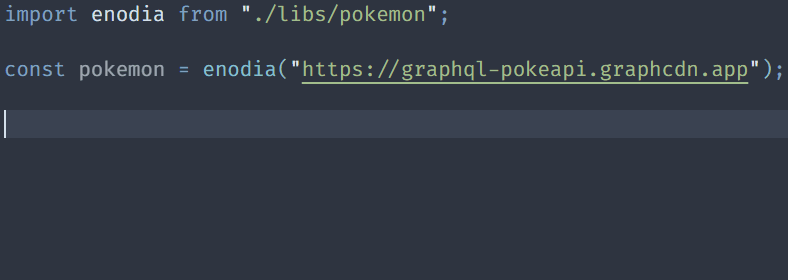enodia v0.10.1
Enodia
Enodia is a GraphQL client and server generator for Typescript projects. It generates fully typed client and server files from your GraphQL schema, allowing you to have automatic types in return of your queries and mutations, type safety when providing arguments and fields, and a fully typed server to ensure your resolvers return the expected values.

Installation
As Enodia is needed only to generate the files, you can install it as a dev dependency:
npm install -D enodiaFinally, you will need to setup an enodia.config.ts file at the root of your
project. This file should export an object with the following properties:
export default {
// This is either the path to your graphql schema, or the URL where your API runs
schema: "./src/graphql.schema",
// If you only want to generate the server side, you can omit this
client: {
// This is the path where you want the client to be generated
path: "./src/web/enodia.ts"
},
server: {
// This is the path where you want the server to be generated
path: "./src/server/enodia.ts"
}
// If you use custom scalars, you have to define them here
scalars: {
// This is a map of custom scalar types in your GraphQL schema to Typescript types.
// For example, if your GraphQL schema has a `Date` scalar type, you can map
// it to the `Date` type in Typescript.
Date: { name: "Date" },
},
};More information on this file in the configuration section.
Usage
Generating the client
Once your enodia.config.ts file is setup, you can simply run Enodia:
npx enodiaThis will generate a client and a server file at the given paths. You should .gitignore the generated file.
Using the client
The generated file exports a simple enodia function, which takes the URL of
your API as a first parameter. The second parameter is a configuration object,
allowing you to inject a custom fetch function. This can be used to handle
authentication, for example. This function will return the instantiated client.
The client has two properties, query and mutation containing functions to
call every query and mutation your GraphQL API exposes.
Configuration
schema
Enodia needs a GraphQL schema definition to generate the client and server. You can either point to a GraphQL file:
export default {
input: "./path/to/schema.graphql",
};Or provide the URL of your GraphQL API:
export default {
input: "http://localhost:3000/graphql",
};Note that your API will need to be running for Enodia to generate the files.
client
path
If you want to generate the client, you will need to provide its path:
export default {
client: {
path: "./path/to/client.ts",
},
};react
Enodia can also generate React hooks for each query and mutations. All you need for it is to specify the API URL to call:
export default {
client: {
react: {
url: "http://localhost:3000/graphql",
},
},
};As the config file is written in Typescript, you can rely on environment
variables. Note that Enodia does not parse dotenv files by default, so you may
need to rely on the dotenv library.
import "dotenv/config";
export default {
client: {
react: {
url: process.env.GRAPHQL_API_ENDPOINT,
},
},
};scalars
This is a map of scalar types in your GraphQL schema to Typescript types. For
example, if your GraphQL schema has a Date scalar type, you can map it to the
Date type in Typescript.
export default {
scalars: {
Date: { name: "Date" },
},
};If you need to use custom types, you can also provide a path property, which
will be used to import the type from the generated client file.
export default {
scalars: {
Json: { name: "Json", path: "./types" },
},
};The name property is optional when providing a path, if the returned type is
the default export of the module.